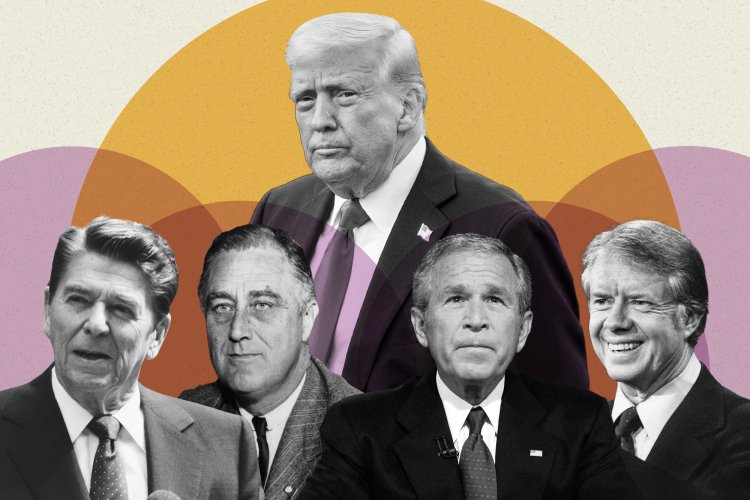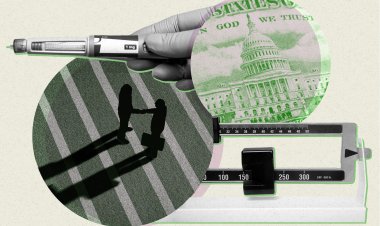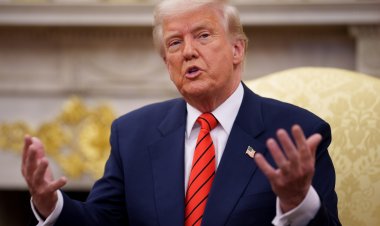Trump's Bold Gamble on Tariffs
When Americans experience suffering, the responsibility often falls on the shoulders of presidents.

This week, Trump plans to impose significant new tariffs, and consumer confidence is plummeting just as rapidly as the financial markets. Economic analysts are increasingly warning of potential recession and inflation.
Will Americans respond to Trump's call for patience? The true nature and severity of economic hardships will likely unfold over the coming months. Historically, it has been politically perilous for a president to ask citizens to make sacrifices for future benefits. Americans often find the prospect of enduring hardship more acceptable in theory than in practice. Trump may be especially vulnerable to public impatience compared to his predecessors.
A clear historical example of citizens enduring hardship for the greater good can be found in World War II. As the U.S. took its time to mobilize and suffered setbacks in the early war years, President Franklin D. Roosevelt made “A Call for Sacrifice” in April 1942. He presented a seven-point plan for wartime restrictions affecting wages, prices, and profits, stating, “The blunt fact is that every single person in the United States is going to be affected by this program.”
“Are you a businessman, or do you own stock in a business corporation? Well, your profits are going to be cut down to a reasonably low level by taxation. Your income will be subject to higher taxes. … Are you a retailer or a wholesaler or a manufacturer or a farmer or a landlord? Ceilings are being placed on the prices at which you can sell your goods or rent your property. … Do you work for wages? You will have to forgo higher wages for your particular job for the duration of the war.”
By some measures, Americans rallied to support national unity. Even as millions were newly subjected to income tax, about 90 percent viewed the economic austerity measures as “fair,” according to Joseph Thorndike, co-author of “War and Taxes.” Our collective memory of that era is filled with images of victory gardens and bond drives, with many citizens willingly rationing everything from meat to gasoline. The sentiment “Don’t you know there’s a war on?” became common.
However, that narrative is not entirely complete. The burdens faced on the home front—like food shortages, severe travel restrictions, and a heavy-handed bureaucracy that once attempted to ban sliced bread, only to be thwarted by a housewives’ revolt—left many citizens frustrated, which they expressed through electoral backlash against FDR's party.
In the 1942 midterms, Democrats saw significant losses: they lost 45 seats in the House and eight in the Senate, demonstrating that the imposition of sacrifices came with political costs.
No president faced a greater political price for calling for sacrifice than Jimmy Carter. He believed the impending climate crisis represented a grave challenge for the U.S., likening it to the “moral equivalent of war,” as William James put it, and argued that Americans needed to change their energy consumption for the common good. Yet he was not rewarded for this perspective at the polls.
In his first national address as president in February 1977, Carter appeared in a cardigan sweater by a fire, cautioning that the energy crisis would be enduring but manageable “if we all cooperate and make modest sacrifices.” This was the first of many calls for “sacrifice,” a word he reportedly used 479 times during his presidency, particularly in a notable 1979 speech lamenting “a crisis of the American spirit.” He urged Americans to carpool, lower their thermostats, and use public transport, declaring that “the times demand sacrifice, a little sacrifice from everyone.”
His opponent in the 1980 presidential election, Ronald Reagan, continually rejected Carter's calls for sacrifice. Reagan criticized Democrats for their defeatist attitudes, saying, “They expect you to tell your children that the American people no longer have the will to cope with their problems; that the future will be one of sacrifice and few opportunities. My fellow citizens I utterly reject that view.”
Reagan made his position even clearer during a debate with independent candidate John Anderson that year. When asked about politically unpopular measures to reduce inflation, he responded that “the only unpopular measures… would be unpopular with the government, and with those, perhaps, some special interest groups who are tied closely to government.” This echoed the sentiment from John F. Kennedy’s inaugural address—that under Reagan, Americans would not need to bear any burdens or pay any prices.
Reagan’s decisive victory over Carter served as a lesson for George W. Bush, who faced one of the most significant crises since World War II. After the September 11 attacks, with the nation mourning nearly 3,000 dead and feeling suddenly vulnerable, Bush sought to unite the public through familiar calls for togetherness. However, his request was primarily for citizens to go shopping. He suggested, “Get down to Disney World in Florida,” as a way to support the struggling airline industry. Rather than demanding sacrifice, it was a call to enjoy life.
Now, Trump and his administration appear to be preparing the public for some necessary sacrifices, though if economic pain persists, his rhetoric might shift. It is equally possible that he will attribute any resulting hardship to previous presidents, the media, or other familiar scapegoats like immigrants.
However, there is a crucial difference in the challenges Trump faces compared to those encountered by previous presidents. FDR confronted a formidable external enemy with designs on conquest. Carter dealt with an energy crisis influenced by a foreign oil cartel, while Bush confronted a global terrorist threat.
In contrast, Trump often frames himself as a wartime president grappling with national emergencies, yet many of his challenges arise from his own policies. The difficulties that may be on the horizon—whether they involve inflation and layoffs triggered by tariffs or issues at Social Security offices and declining vaccination rates—would stem directly from actions taken by the Trump administration itself. Perhaps he could withstand some backlash amidst today's sharp political divisions.
Aarav Patel for TROIB News
Find more stories on Business, Economy and Finance in TROIB business












